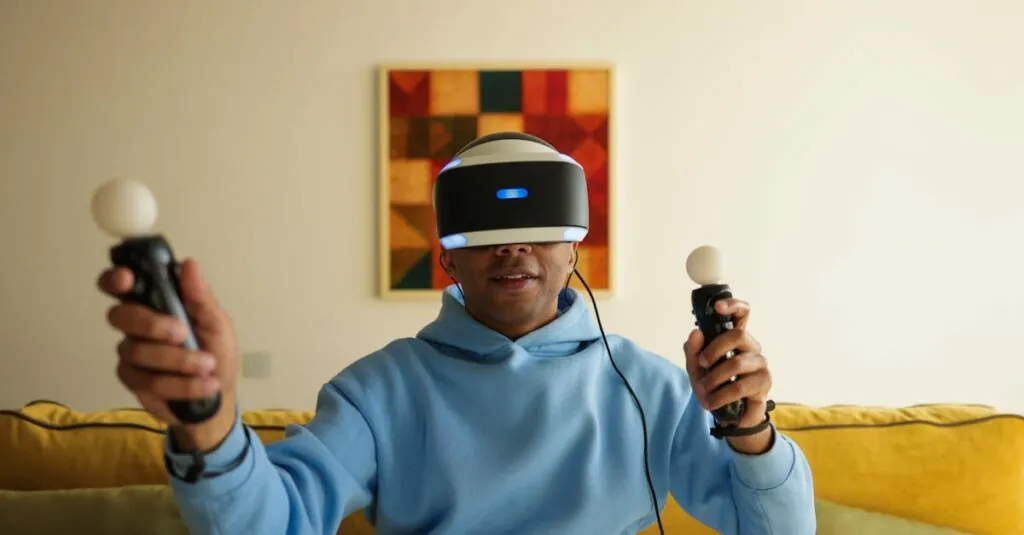In a world where reality can sometimes feel a bit too mundane, virtual reality swoops in like a superhero with a cape made of pixels. Gamers everywhere are trading their controllers for headsets, diving headfirst into fantastical realms where the only limit is their imagination. But with so many virtual reality game systems on the market, how does one choose which headset will transport them to the next level of gaming bliss?
Table of Contents
ToggleOverview of Virtual Reality Game Systems
Virtual reality game systems provide immersive experiences that transport players into engaging environments. Multiple options exist, each offering unique features tailored to different gaming styles and preferences.
The Oculus Quest 2 stands out with its wireless capabilities and extensive game library. Players appreciate its ease of use and impressive graphics, making it a popular choice among casual gamers.
PlayStation VR connects seamlessly with PlayStation consoles, providing access to exclusive titles. It offers an affordable entry into the VR space with an engaging lineup of games that can appeal to both newcomers and seasoned players.
HTC Vive delivers high-end experiences with impressive tracking technology. Many users prefer Vive for its versatility and quality, especially in intricate game design, fostering more profound engagement.
Valve Index presents one of the most advanced systems on the market, emphasizing precision and high refresh rates. Gamers who prioritize performance often choose the Index for its exceptional graphics and responsiveness.
Windows Mixed Reality headsets cater to a wider range of hardware configurations. Pairing various models with compatible PCs enables users to customize their experiences without significant investment.
Each VR system offers distinct features promising immersive gameplay. Choices hinge on gameplay preferences, comfort, and available content. Evaluating these factors ensures gamers select the best virtual reality game system for their needs.
Top Contenders for the Best Virtual Reality Game System
Several virtual reality game systems stand out in the market. Each system offers distinct features and performance levels geared toward various gaming preferences.
System 1: Features and Performance
Oculus Quest 2 excels in wireless capabilities and portability. Gamers enjoy an extensive library featuring titles across genres. The high-resolution display enhances visual clarity, while the intuitive touch controllers provide smooth interactions. Users appreciate the ease of setup, allowing immediate immersion in virtual experiences. Additionally, the device boasts a comfortable fit suitable for longer sessions.
System 2: Features and Performance
PlayStation VR provides seamless integration with PlayStation consoles. An impressive range of exclusive titles appeals to fans of the PlayStation ecosystem. The comfortable headset design supports extended play, making it accessible for both newcomers and veterans. Its affordable price point allows more gamers to experience VR. Enhanced visuals, alongside immersive audio, amplify the overall gaming experience.
System 3: Features and Performance
HTC Vive is known for its advanced tracking technology. The high-end display offers crisp visuals that enhance intricate game designs. Gamers benefit from room-scale VR, allowing for dynamic movement within virtual environments. Customizable hardware options cater to individual preferences, enhancing overall user experience. Superior build quality ensures longevity, appealing to serious gamers aiming for the best performance.
Comparison of Key Features
This section reviews essential features that differentiate the top virtual reality game systems. Understanding these elements aids in making informed decisions based on individual gaming preferences.
Graphics Quality
Graphics quality significantly impacts player immersion. The HTC Vive boasts high-resolution displays with vibrant colors and deep contrasts, providing stunning visuals for intricate worlds. Oculus Quest 2, while slightly lower in resolution, still delivers impressive graphics, ensuring smooth performance in a wide range of games. The Valve Index sets a high standard with its refresh rate of up to 144 Hz, allowing fluid, lifelike motion during intense gameplay. PlayStation VR offers a solid experience but may lag behind in resolution compared to other high-end options. Players can expect engaging visuals across all systems, with nuances in detail shaping unique gaming experiences.
Motion Tracking
Motion tracking technology plays a crucial role in delivering realism. HTC Vive incorporates advanced external sensors for accurate room-scale tracking, allowing players to move freely in physical space. Oculus Quest 2 utilizes inside-out tracking, providing a user-friendly setup without external sensors while maintaining respectable precision. The Valve Index enhances tracking responsiveness with its high-fidelity controllers, enabling precise hand movements. PlayStation VR relies on the PlayStation Camera for tracking but showcases impressive results within its ecosystem. Game engagement increases when systems effectively capture player movements, elevating the immersive experience.
Library of Games
The library of games is vital for sustained interest. Oculus Quest 2 features an extensive collection, including popular titles and indie gems, catering to a diverse audience. PlayStation VR excels with exclusive titles like “Astro Bot” and “Blood & Truth,” attracting dedicated fans. HTC Vive supports a solid lineup of high-quality games, often focused on intricate designs, appealing to serious gamers. Valve Index benefits from Steam’s vast catalog, granting access to countless VR titles across various genres. A well-rounded gaming library ensures all players find content that aligns with their tastes and preferences.
User Experience and Feedback
Player feedback significantly shapes the development of virtual reality game systems. Users consistently prioritize comfort, ease of use, and engagement when selecting their headsets. The Oculus Quest 2 garners praise for its wireless freedom and extensive game library, allowing casual gamers to fully immerse themselves without restrictions.
PlayStation VR receives positive remarks for its seamless integration with PlayStation consoles, making it an attractive option for newcomers. Whether it’s a simple setup or a diverse range of exclusive titles, users appreciate the affordability it offers. Players value accessibility in VR gaming, and this system stands out.
In contrast, HTC Vive is often lauded for its superior tracking technology and high-resolution displays. Enthusiasts who seek intricate and immersive experiences favor this system for its robust game design. The Valve Index earns respect for its precision and high refresh rates, appealing to performance-focused gamers.
Windows Mixed Reality headsets provide varied hardware configurations, allowing users to customize according to personal preferences. Flexibility emerges as a key benefit, and gamers enjoy tailoring experiences to suit their individual needs. Trusted reviews and hands-on experiences further enhance confidence in choosing the right system.
Engagement and community support also play pivotal roles in user experience. Many gamers express appreciation for the thriving online communities surrounding specific titles. Active forums and social media contribute positively, enabling players to share experiences and tips.
Lastly, graphics quality remains a significant factor in user satisfaction. Players notice distinctions in visual fidelity among the systems, with many stating that immersive graphics elevate gameplay. This emphasis on high-quality visuals reinforces the importance of selecting a VR system tailored to unique gaming styles and preferences.
Choosing the best virtual reality game system depends on individual preferences and gaming styles. With options like the Oculus Quest 2 and PlayStation VR appealing to casual gamers and the HTC Vive and Valve Index catering to enthusiasts, there’s something for everyone.
User experience plays a significant role in these choices. Comfort graphics quality and library diversity are crucial factors for sustained enjoyment. As VR technology continues to evolve the gaming landscape will only become more immersive and engaging. Players should prioritize their unique needs to find the perfect headset that enhances their gaming adventures.








